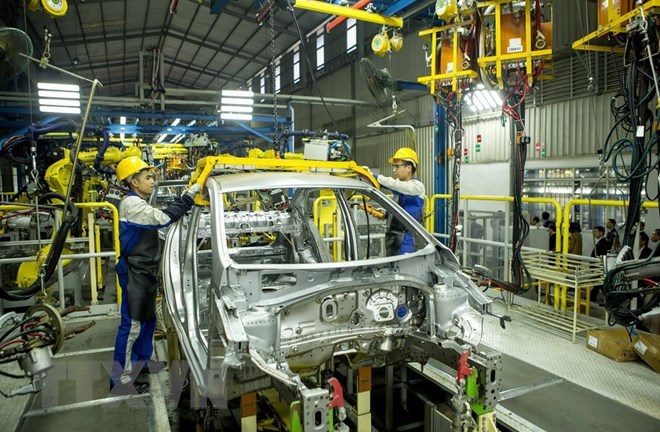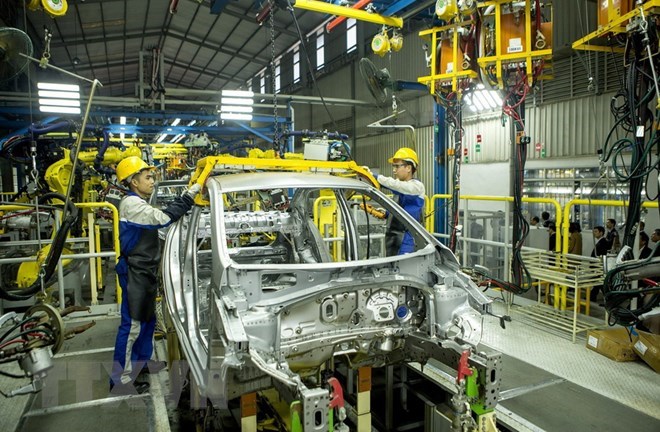
Auto businesses are concerned about Vietnam’s future policy orientation with regard to the auto industry, which they think will affect their business strategy.
A factory of Hyundai Thanh Cong (Photo: VNA).
The concerns were
raised after the businesses received a Government document instructing relevant
ministries and agencies to build technical barriers to control the quality of
imported vehicles.
Businesses recommended that the Government maintain stable long-term
policies for them to assure future investment in Vietnam.
The request was sent to the Government after an inter-sector auto
inspection team worked with 17 auto importers and locally-assembled
manufacturers to solve issues while implementing the Government’s decree on car
manufacturing, assembly, importation and warranty offering - a move that came
into effect from January 1, 2018, and tightened car imports.
Enterprises must now receive vehicle type approval (VTA) certification
when importing cars from the authorities of the importer country. Businesses
can be granted VTA certification when importing vehicles from Thailand and
Indonesia; however, with vehicles imported from Japan, they cannot obtain it as
the Japanese Government doesn’t grant such certification for exported vehicles.
The enterprises proposed that the Government allow the use of the test report
from the vehicle manufacturer.
When importing cars from Europe, the auto businesses petitioned the
Government to accept certificates of technical safety and environmental
protection, provided by the European manufacturers, instead. Europe applies
Euro 6 emission standards, whereas Vietnam applies just Euro 4, thus the
vehicles are guaranteed to meet Vietnamese standards.
In addition, businesses importing cars said that the inspection and
testing procedures for each batch of imported vehicles is time consuming and
costly, causing an imbalance between locally produced cars and imported ones.
Therefore, they proposed the Government consider reducing the number of
samples tested from each batch of cars produced.
Regarding locally-assembled production, the auto businesses expected the
Government to continue recognising the certificate of components issued in
accordance with European Economic Commission without testing or certification
in Vietnam.
The investment in new trial roads is time-consuming and costly, they said,
because now all automakers have invested in the test track.
Based on the recommendations of the enterprises, the inter-sector auto
inspection team has directly answered 74 out of 85 queries, the remaining
issues will be reported to the Government to consider and remove on a
case-by-case basis.
Car prices fluctuate
After reducing import tax on CBU units to zero percent from the beginning
of this year, the Vietnamese automobile market recorded two companies have been
qualified to import cars for distribution at a significantly lower cost.
However, due to the scarcity of supply, some firms have increased the price of
locally assembled vehicles.
According to calculations of insiders, when imported vehicles levied with
zero percent of tax incentives under the ASEAN Trade in Goods Agreement, car
prices were supposed to decrease by 20 – 25 percent compared to that of
previous year. However, the Government’s Decree 116 issued at the same time
required importers to meet several strict conditions that make it difficult to
import cars to Vietnam.
The remarkable point of the decree is that the importers must have vehicle
type approval (VTA) certification from authorities in exporting countries.
From the beginning of the year to date, there are only two companies -
Honda and GM - that imported cars to Vietnam after they gained VTA
certification from exporting countries. In March, Honda imported about 2,000
cars in four types including CR-V, Civic, Jazz and Accord. This was also the
first batch of cars imported into the country since the import tax rate of
autos from ASEAN decreased to zero percent.
In the above four types, the most anticipated one is CR-V, which is priced
from 963 million VND to 1.073 billion VND, close to 200 million VND cheaper
than the 2017 price.
Along with Honda, GM Vietnam recently imported the Chevrolet Trailblazer
sport utility vehicle from Thailand, priced from 859 million VND to 1.075
billion VND. At the same time, the firm announced discounts for this car from
30 million VND - 80 million VND.
Unlike Honda and GM, the preferred imported cars such as the Toyota
Fortuner, Ford Explorer, Toyota Land Prado and the Ford Ranger were not
imported, as importers have not yet completed the procedures according to
Decree 116.
Cars imported from Europe in general and from Germany in particular, which
are subject to a 70 percent import tax, are also heavily affected by the new
regulations of Decree 116. As a result there has not been any model of Audi,
BMW or Volkswagen that has been imported to serve domestic consumers so far
this year.
According to disclosures from a number of enterprises, there weren’t many
cars imported before 2018, as such businesses are trying to complete the import
procedures to bring the car to consumers in the beginning of the third quarter
this year.
The difficulties of importing vehicles to Vietnam has led to a scarcity of
supply, thus companies assembling cars domestically, which are given a 5
percent reduction to special consumption tax, and enjoy no import duty tax, are
beginning to take advantage of the situation by raising prices.
In early May, Nissan Vietnam suddenly increased the price of its model
Sunny XL by 10 million VND, bringing the overall cost to 438 million VND. They
also increased the cost of the model XV by 11 million VND, bringing the cost up
to 479 million VND.
Along with Nissan, Mitsubishi Motors Vietnam also raised the selling price
for Outlander 2.0 CVT low-end model in May an additional 15 million VND, to a
total of 823 million VND.
Similarly, Truong Hai Automobile joint Stock Co (Thaco) rose the price of
Kia Cerato 1.6L to 530 million VND, a 5 million VND increase, and increased the
cost of the Cerato 2.0 to 635 million VND, a 6 million VND raise. It also
raised the price of two versions of the Mazda 2 by 30 million VND each to 529
million VND and 569 million VND, respectively.
Source: VNA
According to data from the Hoa Binh Provincial Party Committee, the industrial production index for the first six months of 2025 is estimated to have increased by 20% compared to the same period last year. This marks the highest year-on-year growth rate for this period since 2020.
In the first six months of 2025, Hoa Binh province’s export turnover was estimated at 1.145 billion USD, marking an 18.11% increase compared to the same period in 2024. Import turnover was estimated at $ 804 million, a 17.15% increase, which helped the province maintain a positive trade balance.
The lives of the ethnic minority farmers in Tan Lac district have gradually improved thanks to the new directions in agricultural production. This is a testament to the collective strength fostered through the professional associations and groups implemented by various levels of the district’s Farmers’ Union.
With the motto the "product quality comes first,” after nearly one year of establishment and operation, Muong village’s Clean Food Agricultural and Commercial Cooperative, located in Cau Hamlet, Hung Son Commune (Kim Boi district), has launched reputable, high-quality agricultural products to the market that are well-received by consumers. The products such as Muong village’s pork sausage, salt-cured chicken, and salt-cured pork hocks have gradually carved out a place in the market and they are on the path to obtaining the OCOP certification.
In the past, the phrase "bumper harvest, rock-bottom prices" was a familiar refrain for Vietnamese farmers engaged in fragmented, small-scale agriculture. But today, a new spirit is emerging across rural areas of Hoa Binh province - one of collaboration, organisation, and collective economic models that provide a stable foundation for production.
Maintaining growing area codes and packing facility codes in accordance with regulations is a mandatory requirement for agricultural products to be eligible for export. Recently, the Department of Agriculture and Environment of Hoa Binh province has intensified technical supervision of designated farming areas and packing facilities to safeguard the "green passport" that enables its products to access international markets.



